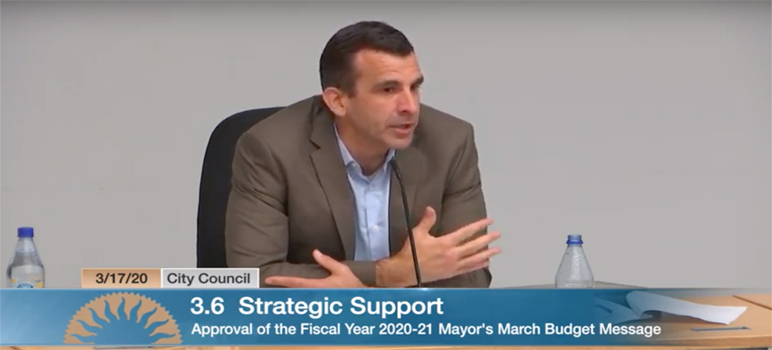A lot has changed since San Jose Mayor Sam Liccardo authored his annual March budget message less than two weeks ago.
At the time, Santa Clara County had 24 confirmed cases of COVID-19, compared to the 155 announced Tuesday afternoon, and health officials had yet to implement the order to “shelter in place.” But as the coronavirus spreads throughout the community, city officials are increasingly worried about how it will impact the city’s financial health.
“It goes without saying, we find ourselves in a different place than we did just a week ago,” City Manager Dave Sykes said at Tuesday’s City Council meeting.
In Liccardo’s budget proposal, he divides up priorities into three tiers: fiscal resilience, affordable housing and homelessness solutions funded by Measure E. The first tier will allocate $51 million to increase the city’s “fiscal resilience” by saving dollars, paying down debt and reducing dependence on the general fund.
The second tier focuses on utilizing Measure E—a real property transfer tax ballot initiative that was passed by San Jose voters in the recent March primary election. The council previously passed a spending plan to divvy up the measure’s revenue, which will come from a tax on the sale of homes assessed above $2 million.
But in his budget message, Liccardo asked city officials to earmark money for a few more priorities, including the construction of tiny homes, housing college students through an Airbnb partnership and exploring the creation of a navigation center.
The remaining tier is made up of contingent expenditures that, due to the impact of COVID-19, may not make the cut. It includes priorities like increasing staffing for the San Jose Police Department, improving traffic safety and expanding community programs.
“We’re going to have to hang on and find out whether we’re even going to have that,” Liccardo said. “The world is going to change very dramatically fiscally.”
The mayor estimates the city’s deficit once the pandemic is over could be around $100 million. As San Jose leaders brace themselves for drastic cuts, Councilwoman Maya Esparza says she wanted to ensure that equity is taken into consideration before programs go to the chopping block.
“In the last recession, we didn’t really take equity into consideration when we made cuts to services in our city and we had to cut our city down to bare bones,” Esparza said.
The city manager will roll out his own budget message in May before the council approves the final 2020-21 spending plan before the end of June.


> The council previously passed a spending plan to divvy up the measure’s revenue, which will come from a tax on the sale of homes assessed above $2 million.
OUTRAGEOUS!
You’ve just made my mad all over again.
How many people will pay this tax? 500? 1,000?
Isn’t it EVERYONE’S civic duty pay taxes?
This is NOT civilization. This is just a “democratic” majority (“fifty percent plus one”) making a tiny minority pay for their bloated pensions, bread and circuses, and virtue signaling.
Scratch a “liberal”, and you’ll find a fascist tyrant, every time without exception. Throughout history, there was only one way people were able to shrug off tyrants such as the ones who like ticks embedded themselves in the local government of San Jose.
Sic Semper Tyrannis